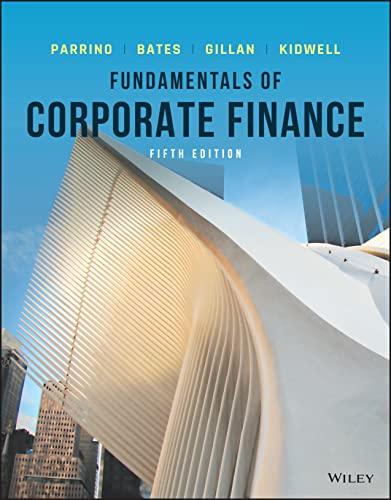Question
The CFO of Baldwin Corporation, Gregg Williams is meeting with the companys board of directors to discuss the possible effect of the companys capital budgeting
The CFO of Baldwin Corporation, Gregg Williams is meeting with the companys board of directors to discuss the possible effect of the companys capital budgeting project on the stock price. Gregg believes that when the NPV of $159,624 is released in conjunction with existing information on the company, the stock price will increase by $0.15 given that the company has 1,000,000 shares outstanding. Gregg believes that all investors are rational and will make investment decisions after analyzing all available information. Greggs belief is consistent with the theory of efficient capital markets, which he studied at the graduate school.
The theory of efficient capital markets holds that stock prices reflect all available information. Gregg gave the implications of the theory as follows:
- Because information is reflected in prices immediately, investors should expect to obtain a normal rate of return. Information reflects so quickly in stock prices that no investor can gain competitive advantage over other investors.
- Prices of stocks will only change if new information becomes available.
- There are many market participants such that no one participant controls the market
- Firms should expect to receive fair value for securities that they sell. Fair means that the price they receive from selling securities is the present value of cashflows that the asset is expected to generate. Thus, valuable financing opportunities that arise from fooling investors does not exist in efficient markets.
A board member, Jon Milosvoski has drawn Greggs attention to three forms of market efficiency namely weak form efficiency, semi-strong efficiency, and strong form efficiency. Mr. Milosvoski explains that under each form, different types of information are assumed to reflect in stock prices.
Another board member, David Jefferson, says that new research studies are emerging in behavioral finance that question the rationality of investors. Mr. Jefferson explains that investors do not act rationally all the time in the investment decision making process so the market cannot be efficient. The results of the studies indicate that investors are prone to heuristics-driven biases such as overconfidence, decision regret, familiarity, conservatism, representativeness and house-money effect.
The meeting was postponed to next week when the board will meet to finish the discussion on the efficient markets and consider capital structure of Baldwin Inc.
The board chairman wants you to address the following questions before the next meeting.
1. Explain how behavioral biases of overconfidence, regret, representativeness, and familiarity can affect investment behavior of investors of Baldwin Inc.
Step by Step Solution
There are 3 Steps involved in it
Step: 1

Get Instant Access to Expert-Tailored Solutions
See step-by-step solutions with expert insights and AI powered tools for academic success
Step: 2

Step: 3

Ace Your Homework with AI
Get the answers you need in no time with our AI-driven, step-by-step assistance
Get Started


